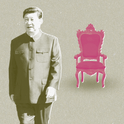To edit is to choose. Now I have to pick the best of my choices during my time as editor, from the publication of the first issue in October 1995 up until now. But first, some thoughts on how the magazine has evolved over the past 15 years, and how it has reflected and contributed to the debates of its time. When we launched in September 1995, Yitzhak Rabin was still prime minister of Israel (he was murdered two months later), Bill Clinton was heading towards re-election in the US and Tony Blair was 18 months from his first election victory in Britain. In the west, liberal baby boomers were coming to power hoping to take advantage of the end of the cold war to reform domestic and international politics. It would be too bleak to say that the story of the past 15 years is a catalogue of disappointed hopes. But when we launched there was certainly a post-cold war sense of possibility that has been lost. Prospect was loosely part of the mid-1990s centre-left revival, embodied by Tony Blair, but we were never narrowly party political and sought the most interesting and authoritative voices from all over the political spectrum. In fact, what made us distinctively post-cold war was how lightly we carried our convictions: despite being in a loose sense a magazine of ideas, we were not trying to save the world from anything or convert it to anything (unlike our monthly predecessors Encounter, which was saving us from communism, and Marxism Today, which was committed to some kind of socialist transformation). The magazine tried to reflect and celebrate the messiness of our new times. We were more liberal than conservative in political outlook, but stood for nothing much more than good writing (especially essays and long form writing), independence of mind and an optimistic realism about human affairs.
Comparing the first issue with a more recent one there are certainly family resemblances, but many changes too. Amartya Sen’s first-issue cover essay on the interconnection between economic growth and political freedom—with special focus on China and India—is the kind of big picture argument that we might run as a cover story today (though now it would be far more tightly edited). There were plenty of stylish writers on display: Alan Ryan, Frederic Raphael and the then unknown comic writer Jeremy Clarke (who was poached a few years later by the Spectator). Andrew Adonis (who also appears, in disguise, in my final issue as editor) was then an FT journalist and wrote a prescient piece on how Tony Blair could be his own secretary of state for education. But apart from an essay by Brian Glanville on sports journalism, there was little on culture or the arts. That began to change with Jason Cowley’s literary essays and interviews and was given further impetus by the arrival of in 2001 of Alexander Linklater as my second deputy (taking over from Valerie Monchi). He introduced many of the arts writers, like Mark Cousins on cinema and Ben Lewis on art, who still write for Prospect today. We also began publishing short stories in every issue, and including more narrative journalism and reportage. Subjectivity began to count as well as arguments and ideas. (And our distinctive selection of cartoons began to attract attention too.)
Flicking through the last 177 issues, one gets a sense of how rapidly intellectual fashions come and go. In our early days we hosted many of the important debates around the rise of new Labour, such as Will Hutton’s “stakeholding”—which briefly flickered back into fashion after the financial crash. And in the late 1990s we reflected the rising interest in popular science—with John Maddox (father of my successor Bronwen), Matt Ridley, Oliver Morton, Philip Ball, Ray Tallis, Kenan Malik, Oivia Judson, Ian Stewart and John Gribbin all making notable contributions (plus Alun Anderson’s interviews with leading figures in the politics of science such as John Krebs and Craig Venter). We wrote regularly about genetics and evolutionary psychology and, in what must count as one of the oddest marketing stunts in magazine history, we gave away a CD-Rom of the human genome (stuck on to the front cover) to mark our fifth anniversary in October 2000! In a small way, we were global pioneers. The 9/11 terrorist attacks changed the intellectual and political agenda. The strike took place just 24 hours before our monthly deadline, and Anatol Lieven turned around a 5,000 word overview within 24 hours—even before it was clear who was responsible (knocking off the cover one of the smartest of Robert Cooper’s many smart essays of that time, this one on the return of the idea of empire). For a while the magazine became more focused on foreign policy: Islam and democracy and the emerging tensions between the US and Europe. (Never averse to reprinting things from elsewhere if sufficiently interesting, we were the first European magazine to publish Robert Kagan’s neoconservative analysis of that transatlantic tension with its famous soundbite: Americans are from Mars, Europeans are from Venus). And in our second most bizarre marketing stunt we gave away a CD-rom of the Koran (plus a bluffer’s guide to Islam) in our November 2001 issue. Into the 2000s we became less political in a policy sense, while starting to find our political identity: we stopped worrying so much about the progress of, say, Britain’s constitutional reform programme and began to explore the deeper tensions within modern liberalism itself. This led to my own essay “Too Diverse?”, which was reprinted in the Guardian in February 2004 and provoked a wide, sometimes acrimonious, debate about the tension between diversity and solidarity which I had highlighted in the essay. That in turn led into arguments (mainly sceptical) about mass immigration (see Bob Rowthorn’s In Defence of Fortress Europe) identity politics (see various pieces by Kenan Malik) and Britishness (most notably a 2005 roundtable with Gordon Brown). We have taken similarly “contrarian” arguments on the unintended consequences of feminism (see Alison Wolf on the end of female altruism) and more recently my own pieces questioning the liberal consensus on the death of social mobility and the supposed crushing of civil liberties. More broadly, Prospect has been a forum for the debate within liberal baby-boomer Britain about the legacy of the 1960s (see the letter exchange between Melanie Phillips and Polly Toynbee on the family and the one between the Hitchens brothers, plus Michael Ellott’s “Rude Britannia,” see above, all in the late 1990s). Those letter exchanges (we used to include them in every issue, now more rarely) came to rather define the spirit of the magazine in the early days: different points of view arguing it out within one magazine. Some of the most notable included Robert Skidelsky v Michael Ignatieff on whether military intervention in Kosovo is justified, Matthew Collings v Brian Sewell on whether contemporary British art is any good, Peter Singer v Kenan Malik on whether apes have rights, Kathryn Hughes v Ben Rogers on whether the television drama ER is art, AC Grayling v Keith Ward on God after the tsunami, William Easterly v Hilary Benn on whether foreign aid works and Will Hutton v Meghnad Desai on whether China will rule the world. The clash of ideas has also been reflected in several notable “roundtables” (the discussion on global order in the 21st century with Francis Fukuyama, Eric Hobsbawm, Edward Luttwak, Timothy Garton Ash, Pierre Hassner and Robert Cooper; the debate on the meaning of the genetics revolution with James D Watson, Steve Jones, Robert Plomin and others; the argument about Islam and the west with Fred Halliday, Mai Yamani and others, and most recently arguing about the financial crisis with Martin Wolf, George Soros, Anatole Kaletsky, John Gieve and others). Our big set-piece interviews with several participants quizzing one subject from different perspectives—most notably in recent years Tariq Ramadan, Ken Livingstone, David Miliband (above) and Adair Turner—have reflected, too, a spirit of intellectual restlessness from what my successor Bronwen Maddox calls the “argumentative centre.” (Our interviews with big figures from history—Marx, Gandhi and so on—was one of those good ideas that didn’t quite come off.) We have always been an internationally minded magazine, with regular columns from Brussels, Washington, China. We have, of course, followed events and arguments within Europe (most notably with Charles Grant and Andrew Moravcsik), the wars in Iraq (with remarkable reportage from Bartle Bull and Rory Stewart) and Afghanistan (see Stephen Grey and Anthony King), and in recent years the rise of China and India (see Rob Gifford on China’s unknown metropolis, and the reasons why India has not developed a welfare state by Chakravarthi Ram-Prasad). The magazine has reflected the fact that the channel is wider than the Atlantic, it has often been easier to attract the intellectual stars of North America—Francis Fukuyama, Jared Diamond, Steven Pinker—than their equivalents in France, Germany or Italy. In the past few years we have continued to diversify away from politics and current affairs, although we did launch Philip Blond’s Red Tory blast on the world. We have been ahead of the curve on a few things: thanks to Erik Tarloff for spotting the television series the Wire early and to Joy Lo Dico for doing the same with Spotify. And we have certainly become more tecchie. We have followed the big debates about the internet (see Evgeny Morozov's essays) and the changing forms and roles of the media (John Lloyd’s thesis on the media class v the political class was first aired in Prospect). The financial crisis brought us back to some economic basics, and Prospect had a good crisis, thanks in part to the financial journalist Jonathan Ford arriving as my deputy in the nick of time. Ford’s own piece on why finance has grown so big was a classic as was Robert Skidelsky’s piece on what comes next. And to finish, here are my ten favourite pieces from the past 15 years of Prospect, in no particular order. 1. My brother the bomber:Shiv Malik’s piece on Mohammed Sidique Khan, had narrative tension (as he tracked down Khan’s brother) and intelligent analysis of why MSK master-minded 7/7 2. The coming of Shia Iraq: Bartle Bull’s brilliant piece of reportage on the emerging politics of post-invasion Iraq 3. Afghan in the dock: James Fergusson’s sad tale of how an Afghan asylum seeker ended up in Pentonville prison 4. Vanilla Bright Like Eminem:Michel Faber’s beautiful short story 5. The greengrocer's revenge:Ivan Krastev’s piece on eastern Europe’s new elite and the popular anger about the transition, full of psychological insight 6. The last tiger:Ruth Padel gets inside the mind of a tiger 7. Norman's conquest: Rowan Moore’s portrait of Norman Foster was a model of tempered hostility 8. Voodoo Chile:Paul Broks on how a brain tumour can look like a mid-life crisis 9. Annus memorabilis: Geoffrey Wheatcroft’s piece about 1997, the meaning of a significant year 10. The science of eternity: Martin Rees’s piece about eternity where science and poetry meet. Head to our blog to find out which Prospect articles had the most impact on public debate, and to see which articles just missed out on the top 10








